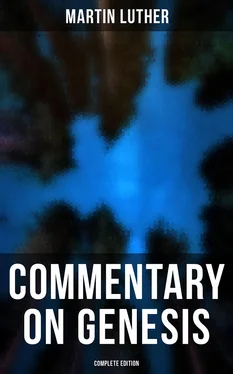Martin Luther - Commentary on Genesis (Complete Edition)
Здесь есть возможность читать онлайн «Martin Luther - Commentary on Genesis (Complete Edition)» — ознакомительный отрывок электронной книги совершенно бесплатно, а после прочтения отрывка купить полную версию. В некоторых случаях можно слушать аудио, скачать через торрент в формате fb2 и присутствует краткое содержание. Жанр: unrecognised, на английском языке. Описание произведения, (предисловие) а так же отзывы посетителей доступны на портале библиотеки ЛибКат.
- Название:Commentary on Genesis (Complete Edition)
- Автор:
- Жанр:
- Год:неизвестен
- ISBN:нет данных
- Рейтинг книги:4 / 5. Голосов: 1
-
Избранное:Добавить в избранное
- Отзывы:
-
Ваша оценка:
- 80
- 1
- 2
- 3
- 4
- 5
Commentary on Genesis (Complete Edition): краткое содержание, описание и аннотация
Предлагаем к чтению аннотацию, описание, краткое содержание или предисловие (зависит от того, что написал сам автор книги «Commentary on Genesis (Complete Edition)»). Если вы не нашли необходимую информацию о книге — напишите в комментариях, мы постараемся отыскать её.
Commentary on Genesis is the last work of Martin Luther, written during the last several years of his life. Luther's work follows the first volume of Psalms with critical and devotional remarks on the creation and on sin and the flood.
Commentary on Genesis (Complete Edition) — читать онлайн ознакомительный отрывок
Ниже представлен текст книги, разбитый по страницам. Система сохранения места последней прочитанной страницы, позволяет с удобством читать онлайн бесплатно книгу «Commentary on Genesis (Complete Edition)», без необходимости каждый раз заново искать на чём Вы остановились. Поставьте закладку, и сможете в любой момент перейти на страницу, на которой закончили чтение.
Интервал:
Закладка:
But here another inquiry may arise concerning the fall of Adam itself, upon which indeed we have already touched: On what day Adam fell, whether on the seventh or on some other day? Although nothing indeed can be said as certain on this matter, my free and full opinion is that his fall was on the seventh day. It was on the sixth day that he was created. And Eve was created about the evening or close of the sixth day, while Adam was asleep. On the seventh day, which by the Lord had been sanctified, God talks with Adam, gives him commandment concerning his worship, and forbids him to eat the fruit of the tree of knowledge of good and evil. For this indeed was the appropriate work or duty of the seventh day: the preaching and the hearing of the Word of God. Hence both from the Scriptures and from universal practice, hath remained the custom of appointing the morning as the time for prayer and sermons; as we have it also in the Psalms: "In the morning will I stand before Thee, and will look up," Ps. 5:3.
On the seventh day therefore, in the morning, Adam appears to have heard the Lord giving commandment concerning his domestic and national duty, the private and public worship of God, together with the prohibition concerning the fruit of the tree. Satan therefore unable to endure this most beautiful creation of man and this holy appointment of the Sabbath, and envying him so much felicity, and moreover seeing all things so abundantly provided for him on earth, and finding him in the possession of the hope of enjoying, after so happy a corporeal life, an eternal life, which he himself had lost, Satan seeing all this about the twelfth hour, perhaps after God's sermon to Adam and Eve, himself preaches to Eve. Just as he has always done to this day. Wherever the Word of God is, there he attempts also to sow lies and heresies. For it agonizes him that we by the Word become as Adam did in paradise, citizens of heaven. So Satan on this occasion tempts Eve to sin, and gains the victory over her. The sacred text before us moreover declares that when the heat of the day had subsided, the Lord came into the garden and condemned Adam with all his posterity to death. I am myself quite persuaded that all these things took place on the very day of the Sabbath, which one day only, and that not for the whole day, Adam lived in paradise, and enjoyed himself in eating its fruits.
By sin therefore did man lose all this felicity. Nor would Adam, had he remained in paradise in all his original innocence, have lived a life of idleness. He would have taught his children on the Sabbath day, he would have magnified God with worthy high-praises by public preaching, and he would have stirred up himself and others to offerings of thanks, by a contemplation of God's great and glorious works. On all other days he would have worked by tilling his ground and attending to his beasts, etc. But in a manner and from motives now wholly unknown to man. For all our labor is annoyance, but all Adam's labor was the highest pleasure, a pleasure far exceeding all the ease that is now known. Hence as all the other calamities of life remind us of sin and the wrath of God, so our labor and all our difficulty in procuring food ought to remind us of sin also and to drive us to repentance.
Moses now proceeds to describe man more particularly, repeating first of all what he had said concerning his creation in the first chapter. And though the recapitulations may seem superfluous, yet as the divine historian wishes to maintain a continuation of his history, with all due convenience and order, the repetition is by no means useless.
V. 4, 5a. These are the generations of the heavens and of the earth when they were created, in the day that Jehovah God made earth and heaven. And no plant of the field was yet in the earth, and no herb of the field had yet sprung up.
"In the day" is here to be taken for an indefinite time, as if Moses had said, At that time the state of all things was most beautiful; but now I must describe a condition of things far different. We need not here inquire however in a superstitious manner, why Moses chose to use these rustic forms of expression concerning "the plants of the field" and "herbs of the field." For his object now is to describe the creation of man in its more circumstantial particulars.
V. 5b, 6. For Jehovah God had not caused it to rain upon the earth: and there was not a man to till the ground; but there went up a mist from the earth, and watered the whole face of the ground.
There was not as yet any rain, Moses says, to water the earth; but a certain mist went up and watered the whole face of the earth, to cause it to bring forth more abundantly afterwards. Now these things belong properly to the third day.
III. V. 7. And Jehovah God formed man of the dust of the ground, and breathed into his nostrils the breath of life; and man became a living soul.
Moses here returns to the work of the sixth day and shows whence this cultivator of the earth came; namely, that God formed him out of the ground, as the potter forms in his hand the vessel out of clay. Hence Moses does not represent Jehovah God as saying in this case as in that of all the other creatures, "Let the earth bring forth man;" but "Let Us make man." He describes God as thus speaking in this case in order that he might set forth the excellency of the human race, and that he might make manifest that peculiar counsel to which God had recourse in creating or making man. However after his creation man grew and multiplied as all the other animals and beasts of the earth multiply. For the seed of all animals coagulates in the womb and is formed in the same manner in them all. In this case of generation there is no difference between the foetus formed in the cow and that formed in the woman. But with reference to their first creation Moses testifies that there was the greatest possible difference. For he shows in this divine record that the human nature was created by a peculiarity of divine counsel and wisdom, and formed by the very finger of God.
This difference, which God made in the original creation of man and of cattle, likewise manifests forth the immortality of the soul, of which we spoke above. And though all the other works of God are full of wonder and admiration and truly magnificent, yet that man is the most excellent and glorious creature of all is evident from the fact that God in creating him had recourse to deep counsel and to a mode entirely different from that which he adopted in creating all the other creatures. For God does not leave it to the earth, to form or bring forth man, as it brought forth beasts and trees. But God forms man himself, "in the image" of himself, as a participator of the divine nature and as one designed to enjoy the rest of God. Hence Adam before he is formed by Jehovah, is a mere lifeless lump of earth, lying on the ground. God takes that lump of earth into his hand and forms out of it a most beautiful creature, a partaker of immortality.
Now if Aristotle were to hear these things he would burst out into a loud laugh and would say, that the whole matter was a fable; a very pleasant one indeed but a very absurd one; that man, who was a lump of earth as to his original, is so formed by divine wisdom to be capable of immortality. For those ancient philosophers, as Socrates and others, who taught the immortality of the soul, were laughed at and almost cast out by all their fellows. But is it not the very extremity of folly for reason to take this great offense, when it beholds the generation of man to this very day full of greatest wonder! For who would not judge it an absurdity to suppose that man, who is designed to live eternally, should be born from one single drop as it were of seed from the loins of the father? There is even a greater apparent absurdity in this than in Moses saying, that man was formed from a lump of earth by the finger of God. But by all this folly reason plainly shows that she understands nothing of God, who, by the efficacy of a single thought, thus makes out of a lump of earth not only the seed of man, but man himself; and makes also, as Moses afterwards says, the woman out of a single rib of the man. This then is the origin of man!
Читать дальшеИнтервал:
Закладка:
Похожие книги на «Commentary on Genesis (Complete Edition)»
Представляем Вашему вниманию похожие книги на «Commentary on Genesis (Complete Edition)» списком для выбора. Мы отобрали схожую по названию и смыслу литературу в надежде предоставить читателям больше вариантов отыскать новые, интересные, ещё непрочитанные произведения.
Обсуждение, отзывы о книге «Commentary on Genesis (Complete Edition)» и просто собственные мнения читателей. Оставьте ваши комментарии, напишите, что Вы думаете о произведении, его смысле или главных героях. Укажите что конкретно понравилось, а что нет, и почему Вы так считаете.












